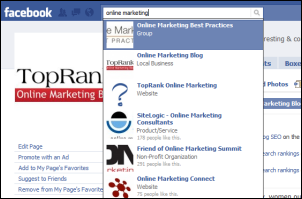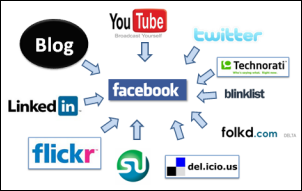 Should you optimize for Facebook? Can you improve Google search results with Facebook SEO?
Should you optimize for Facebook? Can you improve Google search results with Facebook SEO?
At the 2009 MIMA Summit I gave a presentation on the intersection of SEO and Social Media suggesting that companies become publishers in their marketing and that the opportunity for search doesn’t just lie with Google, but also with social search. At the time, Facebook’s internal search emerged as one of the search engine engines tracked by comScore. The idea being marketers can optimize their website content for standard search but also the content they publish within social networks and on social media content sites.
Fast forward: comScore’s June 2010 U.S. Search Engine Rankings report shows that Facebook search queries have grown from 395 million in January of 2010 to 621 million queries in June. That’s almost half the monthly queries reported for Bing (1.7 billion) but not anywhere near the 10 billion plus queries on Google.
With over 800 million registered users worldwide, Facebook still presents an opportunity for marketers to better connect their social content with searchers through optimization. The optimization and search visibility opportunity with Facebook comes in two forms:
- Facebook hosted pages ranking well in external search engines like Google, Yahoo and Bing.
- Content that can be displayed in the search results from Facebook’s internal search engine such as Facebook hosted pages, Facebook Questions and web pages served up through Facebook’s search results partner, Bing.
What to expect from Facebook Search:
 Facebook internal search will show a mix of results from your Facebook network or other Facebook content like apps or groups, off-Facebook web pages and with the launch of Facebook Questions, might send you to Questions pages others have created. If the query reflects a question where none exists, it might prompt you to create one. To segment the the type of Facebook content that’s searched, you need to use the search page, which interestingly does not allow you to filter by Questions.
Facebook internal search will show a mix of results from your Facebook network or other Facebook content like apps or groups, off-Facebook web pages and with the launch of Facebook Questions, might send you to Questions pages others have created. If the query reflects a question where none exists, it might prompt you to create one. To segment the the type of Facebook content that’s searched, you need to use the search page, which interestingly does not allow you to filter by Questions.
Here are several tips to better understand what you can optimize for better search performance with Facebook content:
On Page Facebook SEO:
Pick your page name and vanity URL wisely. Use keywords in the “about” box when you write your description of the page as well as in the Overview section of the info tab. Also, take advantage of FBML (Facebook Markup Language) to add custom content (text, images and links) that can includ relevant keywords that work together with your other keyword use.
When adding content like photos, discussion topics and status updates, think of keywords in titles when appropriate. Whenever you create a unique page on Facebook such as a discussion topic on a Fan page, there is an opportunity to implement most of the standard SEO tactics you would use with a web page. If permissions allow, external sites can link to the discussion page, helping it to rank well in standard search engines outside of Facebook.
The newest opportunity to create content on Facebook that shows prominently in Facebook search results are Questions. Be thoughtful about keywords as you title your Facebook Question and the description. The more likes you get for your Question, the more like-ly it will show in search results, so make it interesting, descriptive, interactive (add a poll) and promote it to your network. You could also ask and answer your own questions.

As for getting your website’s pages into Facebook search results, Bing is the gatekeeper. Facebook search results for out of network web pages are provided by Bing so inclusion in Bing is a necessity.
You can incorporate Facebook Open Graph protocol into your website and add a Like button to web pages for things like movies, sports teams, celebrities, and restaurants but there are many other types supported. Basically, this is a set of meta tags that you’d add to the template or source code of your site. Jesper Astrom offers his thoughts on how to get indexed and rank in Facebook Search here that explains how the meta data plus the signal of Likes performed by readers of your web page content can influence rankings on Facebook.
Off Page Facebook SEO:
 Get links to your fan page or any other public pages from relevant, external web sites. That could be your blog or other social profiles as well as author bios or wherever it makes sense to link to your Facebook Fan page. You can also attract links to your page by attracting more fans/likes. Each like is a link or vote for your page, so be sure to give them a reason to “like” your content. Here’s a nice quote from Jesper on the link vs. like topic:
Get links to your fan page or any other public pages from relevant, external web sites. That could be your blog or other social profiles as well as author bios or wherever it makes sense to link to your Facebook Fan page. You can also attract links to your page by attracting more fans/likes. Each like is a link or vote for your page, so be sure to give them a reason to “like” your content. Here’s a nice quote from Jesper on the link vs. like topic:
“It is not the nominal number of fans on a page or in a group that makes your page rank. It is the social closeness of the page to the searcher that makes it rank. This means you shouldn’t spend all your money becoming number one. But you should spend your money on acquiring the right people to put you as number one, making you show up to all their friends and friends of friends when they search on related topics to you.”
Amongst all the things you could be spending your digital marketing time on, does it make sense to focus SEO efforts solely on Facebook? I agree with David Harry, and would say probably not.
However, companies that have already committed to improving search performance of their web content on standard search engines and who are actively building a community on Facebook would do well to understand the additional opportunities for reach afforded by Facebook SEO. In other words, if you’re already under the hood, why not make sure you gain Facebook search benefits too?
Other useful Facebook SEO resources:
- 7 Tips for Boosting the SEO of Your Facebook Page – Jim Belosic on Search Engine Land
- Facebook SEO: Of Links and Likes – John Greer on Search Engine Watch
- Facebook Tests Show SEO May Be Possible With Open Graph – Nick O’Neil on All Facebook
- 10 SEO Tips For Maximizing Facebook Visibility – Marty Weintraub on Search Engine Land
- 10 Key SEO Strategies Every Facebook Page Owner Should Know – Justin Smith on InsideFacebook
Have you tried optimizing content for better performance within Facebook? What about optimizing Facebook content for better visibility within external search engines?


